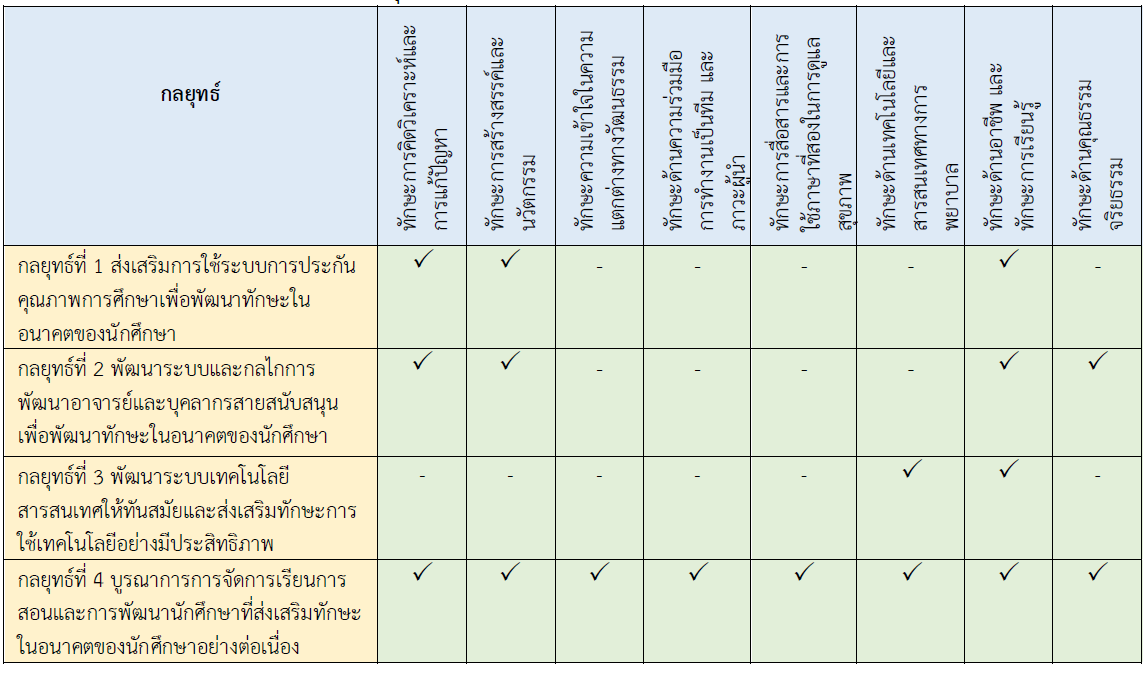กลยุทธ์การพัฒนาทักษะในอนาคตของนักศึกษาพยาบาล คณะพยาบาลศาสตร์ สถาบันพระบรมราชชนก
คำสำคัญ:
กลยุทธ์ , ทักษะในอนาคต, นักศึกษาพยาบาลบทคัดย่อ
การวิจัยเชิงคุณภาพนี้เพื่อสังเคราะห์ทักษะในอนาคตของนักศึกษาพยาบาล พัฒนากลยุทธ์ และประเมินร่างกลยุทธ์การพัฒนาทักษะในอนาคตของนักศึกษาพยาบาล คณะพยาบาลศาสตร์ สถาบันพระบรมราชชนก ดำเนินการ 4 ขั้นตอนคือ ขั้นตอนที่ 1 สังเคราะห์ทักษะในอนาคตของนักศึกษาพยาบาล จากการทบทวนวรรณกรรมและการสัมภาษณ์ผู้บริหารวิทยาลัยพยาบาล จำนวน 8 คน ขั้นตอนที่ 2 สังเคราะห์สภาพแวดล้อมภายในและภายนอกองค์กรจากเอกสารแผนกลยุทธ์ และผู้บริหารวิทยาลัยพยาบาล จำนวน 40 คน ขั้นตอนที่ 3 พัฒนากลยุทธ์จากผลการวิเคราะห์สภาพแวดล้อม ด้วยวิธี TOWS Matrix ขั้นตอนที่ 4 ประเมินกลยุทธ์ จากผู้ทรงคุณวุฒิ จำนวน 10 ท่าน โดยการสนทนากลุ่ม วิเคราะห์ข้อมูลโดยการวิเคราะห์เชิงเนื้อหา ผลการวิจัยพบว่า
1. ทักษะในอนาคตของนักศึกษาพยาบาล คณะพยาบาลศาสตร์ สถาบันพระบรมราชชนก ประกอบด้วย 8 ทักษะ ได้แก่ 1) ทักษะการคิดวิเคราะห์และการแก้ปัญหา 2) ทักษะด้านการสร้างสรรค์และนวัตกรรม 3) ทักษะความเข้าใจในความหลากหลายทางวัฒนธรรม 4) ทักษะด้านความร่วมมือ การทำงานเป็นทีม และภาวะผู้นำ 5) ทักษะการสื่อสารและการใช้ภาษาที่สองในการดูแลสุขภาพ 6) ทักษะด้านเทคโนโลยี 7) ทักษะด้านอาชีพ และ ทักษะการเรียนรู้ และ 8) ทักษะด้านคุณธรรม จริยธรรม
2. กลยุทธ์การพัฒนาทักษะในอนาคตของนักศึกษาพยาบาลคณะพยาบาลศาสตร์ สถาบัน พระบรมราชชนก มี 4 กลยุทธ์ ได้แก่ 1) ส่งเสริมการใช้ระบบประกันคุณภาพการศึกษา เพื่อพัฒนาทักษะในอนาคตของนักศึกษา 2) พัฒนาระบบและกลไกการพัฒนาอาจารย์และบุคลากร เพื่อสนับสนุนการพัฒนาทักษะในอนาคตของนักศึกษา 3) พัฒนาระบบเทคโนโลยีสารสนเทศให้ทันสมัยและส่งเสริมการใช้เทคโนโลยีอย่างมีประสิทธิภาพ และ 4) บูรณาการการจัดการเรียนการสอนและการพัฒนานักศึกษาที่ส่งเสริมทักษะในอนาคตของนักศึกษาอย่างต่อเนื่อง
3. กลยุทธ์การพัฒนาทักษะในอนาคตของนักศึกษาพยาบาล คณะพยาบาลศาสตร์ สถาบัน พระบรมราชชนก ทั้ง 4 กลยุทธ์ มีความสอดคล้อง เหมาะสม เป็นไปได้ และ เป็นประโยชน์ต่อการพัฒนาทักษะในอนาคตของนักศึกษาพยาบาล คณะพยาบาลศาสตร์ สถาบันพระบรมราชชนก
ผลการวิจัย วิทยาลัยพยาบาล คณะพยาบาลศาสตร์ สถาบันพระบรมราชชนกสามารถนำกลยุทธ์ไปใช้ในการออกแบบแผนงาน โครงการ หรือ กิจกรรม เพื่อพัฒนาทักษะในอนาคตของนักศึกษาพยาบาลให้มีประสิทธิภาพมากยิ่งขึ้น
เอกสารอ้างอิง
ASEAN University Network. (2020). Guide to AUN-QA Assessment at Programme Level Version 4.0. Bangkok: Chulalongkorn University.
Chaikongkiat, P., Niha, S. & Chantarasiripoot, B. (2019). 21st Century learning skills of nursing students: A survey research in Yala. The Southern College Network Journal of Nursing and Public Health, 6(1), 112-120. (in Thai)
Chaisooksung, S., Sumettikoon, P., & Siribanpitak, P. (2015). Academic administration strategies to promote 21st century skills of students in alternative private schools. Sripatum Chonburi Academic Journal, 12(1), 99-108. (in Thai)
Chaiyes, C., Preeyanont, P., Phonoi, N., & Thongkanya, P. (2023). Factors affecting to the learning skills in the 21st century among Mahidol university’s undergraduates. Journal of Humanities and Social Sciences Mahasarakham University, 42(3), 340-353. (in Thai)
Chantra, R. & Sarakshetrin, A. (2017). Learning skills in 21st century of nursing students at Boromarajonani college of nursing, Suratthani. The Southern College Network Journal of Nursing and Public Health, 4(1), 180-190. (in Thai)
Choojai, R., Patcheep, K., & Kitnopkiat, K. (2001). Quality of nursing graduates of Boromarajonani college of nursing, Ratchaburi perceived by the superiors, academic year 2018. Journal of Research for Health Improvement and Quality of Life, 1(1), 58-67. (in Thai)
Giles, S. (2018). How VUCA is Reshaping the Business Environment, and What It Means for Innovation. Retrieved April 16, 2021 from https://www. researchgate.net/publication/333907737_How_VUCA_ Is_Reshaping_The_Business_ Environment_and_What_It_Means_for_Innovation.
Junwin, B., Ratchathawan, R., Witwattananggoon, A., & Kanchanaaree, S. (2022). Factors influencing the development of 21st century skills among nursing students: A study from Praboromarajchanok institute, Ministry of public health. The Southern College Network Journal of Nursing and Public Health, 9(3), 1-14. (in Thai)
Khomtanet, S., Saedkong, P., Prombooth, R., Tupsai, T., Thitiyanviroj, B., Butudom, A., et al. (2020). A quality evaluation of the graduates, Boromarajonani college of nursing, Khon Kaen. Journal of Curriculum and Instruction Sakon Nakhon Rajabhat University, 12(34), 133-144. (in Thai)
Khosuk, C. (2017). A qualitative research approach to nursing education in the 21st century. Journal of Ratchathani Innovative Health Sciences, 1(2), 1-13. (in Thai)
Korsakul, V. (2018). Lecture Documents for Strategic Management Courses. Bangkok: Ramkhamhaeng University.
Kwamkhunkoei, J. (2019). Strategic Planning Process. Retrieved December 25, 2021 from https://plan.vru.ac.th/?p=3596
Meekhamthong, P., & Saenpong, K.(2019).Techniques for analyzing development conditions for strategic planning of school. New Academic and Research Journal.9(3), 111–120. (in Thai)
Meenakorn, C. (2019). Strategy Development. Retrieved August 18, 2021 from https://slideplayer.in.th/slide/16002563/ (in Thai)
Namprom, T. (2019). VUCA World. Retrieved April 15, 2021 from https://reder.red/vuga-world-18-12-2019/
Njnpeng, N., Katonyoo, C., Wongla, R., & Chawapeng W. (2004). Development Strategies to be a Leader of Educational Institute of Nursing Colleges, Praboromarajchanok Institute. Retrieved August 18, 2021 from http://cmruir.cmru.ac.th/handle/123456789/1668 (in Thai)
Nursing Council. (2022). The 7th National Nursing Research Conference on Trends and Challenge and Nursing Research Network in the Era of World-Changing Technology on January 27,2022. Retrieved February 5, 2022 from https://www.tnmc.or.th/news/430 (in Thai)
Office of the Education Council. (2021). Future Skill. Bangkok: Office of the Education Council.
Rangabtook, W. (2020). Thai learners’ key competencies in a VUCA world. Journal of Teacher Professional Development, 1(1), 8–18. (in Thai)
Saokhumkate, M. & Mangkhang, C. (2021). Development of Co-Curricular Activities in Social Studies to Promote Futuristic Think Skill for Secondary School Students. Journal of Social Science and Buddhistic Anthropology, 6(6), 373-386. (in Thai)
Saraketrin, A., Rongmuang, D., & Chantra, R. (2019). Nursing education in the 21st century:
competencies and roles of nursing instructors. Journal of The Royal Thai Army Nurses. 20(1), 12 – 20. (in Thai)
Sitvoranonand, N., & Ladavalya Na Ayuthya, S. (2023). Factors, affecting the use of digital technology of staffs in the attorney general’s office, Lampang province. Journal of Modern Learning Development, 8(9), 217-234.
Stephanie L. (2021). Future Skills You’ll Need in Your Career by 2030. Retrieved August 14, 2021, https://www.topuniversities.com/student-info/careers- advice/future-skills-youll- need-your-career-2030.
Wattanakul, P., & Mungsing, S. (2015). Knowledge and skills necessary for learning in the 21st century. APHEIT, 4(1), 84-92. (in Thai)
World Economic Forum. (2020). School of the Future Defining New Models of Education for the Fourth Industrail Revolution. Retrieved December 25, 2021, from https://www.weforum.org/press/2020/01/from-wall-less-design-to-robotics-training-meet-the-16-schools-defining-the-future-of-education/
Youngtrong, P., Siridhrungsri P., & Khamdit, S. (2017). The strategies for the desirable characteristic development of Learners in basic education institutions the 21st century. Suthiparithat, 31(100), 1-12. (in Thai)

ดาวน์โหลด
เผยแพร่แล้ว
ฉบับ
ประเภทบทความ
สัญญาอนุญาต
ลิขสิทธิ์ (c) 2024 วารสารเครือข่ายวิทยาลัยพยาบาลและการสาธารณสุขภาคใต้

อนุญาตภายใต้เงื่อนไข Creative Commons Attribution-NonCommercial-NoDerivatives 4.0 International License.
1. บทความหรือข้อคิดเห็นใด ๆ ที่ปรากฏในวารสารเครือข่าย วิทยาลัยพยาบาลและการสาธารณสุขภาคใต้ ที่เป็นวรรณกรรมของผู้เขียน บรรณาธิการหรือเครือข่ายวิทยาลัยพยาบาลและวิทยาลัยการสาธารณสุขภาคใต้ ไม่จำเป็นต้องเห็นด้วย
2. บทความที่ได้รับการตีพิมพ์ถือเป็นลิขสิทธิ์ของ วารสารเครือข่ายวิทยาลัยพยาบาลและการสาธารณสุขภาคใต้







